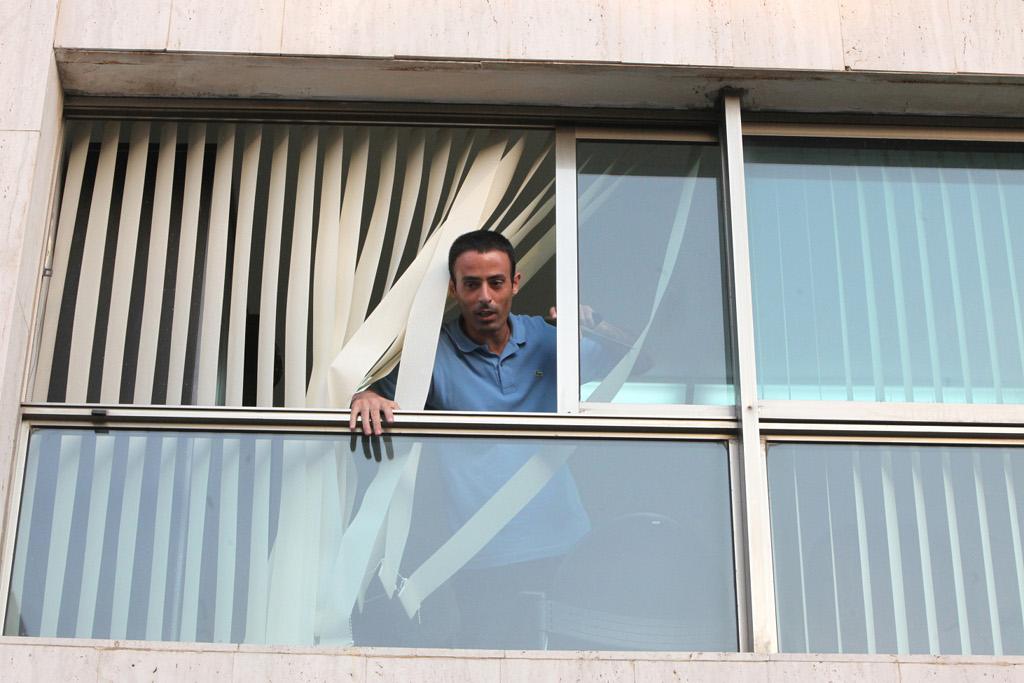Despite rocky relations, business as usual for Turkey and Israel
Palestinian Nadim Injaz is seen at the window of the Turkish Embassy in Tel Aviv, on August 17, 2010. Injaz, allegedly carrying a knife and a toy gun broke into the embassy and attempted to take a diplomat hostage before being overpowered by security, Turkish officials and media said.
Top News: Shots rang out at Turkey’s embassy in Tel Aviv last week as a man identified as Nadim Injaz, a Palestinian from the West Bank, attempted to take the vice-consul and his wife hostage. Injaz, who claims to be a former informant for the Israeli security forces, came to the embassy seeking asylum – and armed with a knife, toy gun and a can of petrol. After a dramatic six-hour standoff Injaz was captured and taken to the hospital with gunshot wounds.
"Nothing happened to them, they're OK," said a spokesman for the Israeli Foreign Ministry of the Turkish staff inside the embassy at the time of the attack. Turkish and Israeli relations, meanwhile, haven’t been so lucky – and the US seems to be flexing its muscles in favor of the latter.
According to The Financial Times, President Barack Obama told Turkish Prime Minister Recep Tayyip Erdogan that Turkey’s tough stance towards Israel is making it more difficult to get approval from the U.S. Congress to sell arms to Ankara. While both sides are denying the row, between Turkey’s spat with Israel and their vote this past June against new sanctions on Iran, those on the Hill are looking to the Bosporus with a new air of skepticism. And such arm-twisting matters to Turkey now more than ever. With the United States pulling out of Iraq at the end of 2011 Ankara is looking to seal a deal they have been eyeing for years and finally purchase an unmanned spy aircraft for use in its fight against Kurdish militants with bases in northern Iraq.
In a move by the Islamic-oriented Turkish government to loosen restrictions on religious expression, Orthodox Christians gathered for mass at the 1,600-year-old Sumela Monastery on Turkey's Black Sea coast for the first time in more than 80 years. An active monastery since the 4th Century, Sumela was abandoned after World War I and the start of the population exchanges between Greece and Turkey. The serviceattracted 2,500 worshipers from Orthodox communities around the world, including from Russia, Armenia and Georgia.
American freelance journalist Jake Hess, 25, was deported this week after writing articles on the Turkish military's alleged abuse of Kurds in the country's southeast. While Hess was detained after his name appeared on an indictment against a Kurdish organization charged with links to the outlawed Kurdish Workers’ Party, groups like Reporters Without Borders and the New York-based Committee for the Protection of Journalists argue that the case comes down to an issue of press freedom. Hess’s most recent article prior to his arrest 'We're Not Living, Just Not Dying', published by the Inter Press Service, details the mass displacement of Kurdish families as a result of Turkish and Iranian bombings of Kurdish border villages in northern Iraq.
Money: While relations between Turkey and Israel have never been worse, economics seem to be trumping politics. Following a deadly Israeli commando raid on a Turkish-led flotilla to Gaza this past May – in which nine Turkish citizens were killed – relations between the former allies sank to a new low. That hasn’t hurt business though. Trade between the countries rose by almost one third from January to July of this year, according to Israel's Central Bureau of Statistics. And while there have been some economic casualties – Turkey lost almost $400 million in last-minute travel cancellations from Israeli tourists, and Israel may lose far more in military contracts – business seem to be, well, business.
After massive reforms following the 2001 financial crisis, Turkey is finally cashing in on its good behavior. When Britain’s Prime Minister David Cameron visited last month he called Turkey “Europe’s BRIC” – and not without reason. Their banking system is solid, the Turkish lira has never been steadier, and the Istanbul Stock Exchange equity index recently hit record highs. And while Turkey’s often tumultuous politics, not to mention its reliance on foreign capital to finance growth, are still sore points, the country is moving ever closer to the golden ticket of investment grade status.
Elsewhere: With the 2010 World Basketball Championship just around the corner, Turkey is warming up for the big event – expected to generate around $200 million in revenues. Now in its 60th year, the men’s championship brings together national teams from across five continents. As this years host Turkey will be stepping into the long shadow of former hosts the United States and Japan, a sign of the country’s rising prestige and a boost to their hopes of hosting the Olympic games. But will it be enough to win?
On a recent trip through Turkey’s southeast I was shocked, upon entering Mardin’s Kasimiye Medresesi, to see people drinking from the courtyard’s ancient fountain – right in front of a giant photographic diptych of the British actress Tilda Swinton. Pulled from a short film by Turkish artist and designer Hussein Chalayan, the images were part ofMardin’s first Biennial this summer, “Abbara Kadabara,” an impressive effort to shift Turkey’s cultural center a little more towards the east.
Every day, reporters and producers at The World are hard at work bringing you human-centered news from across the globe. But we can’t do it without you. We need your support to ensure we can continue this work for another year.
Make a gift today, and you’ll help us unlock a matching gift of $67,000!
